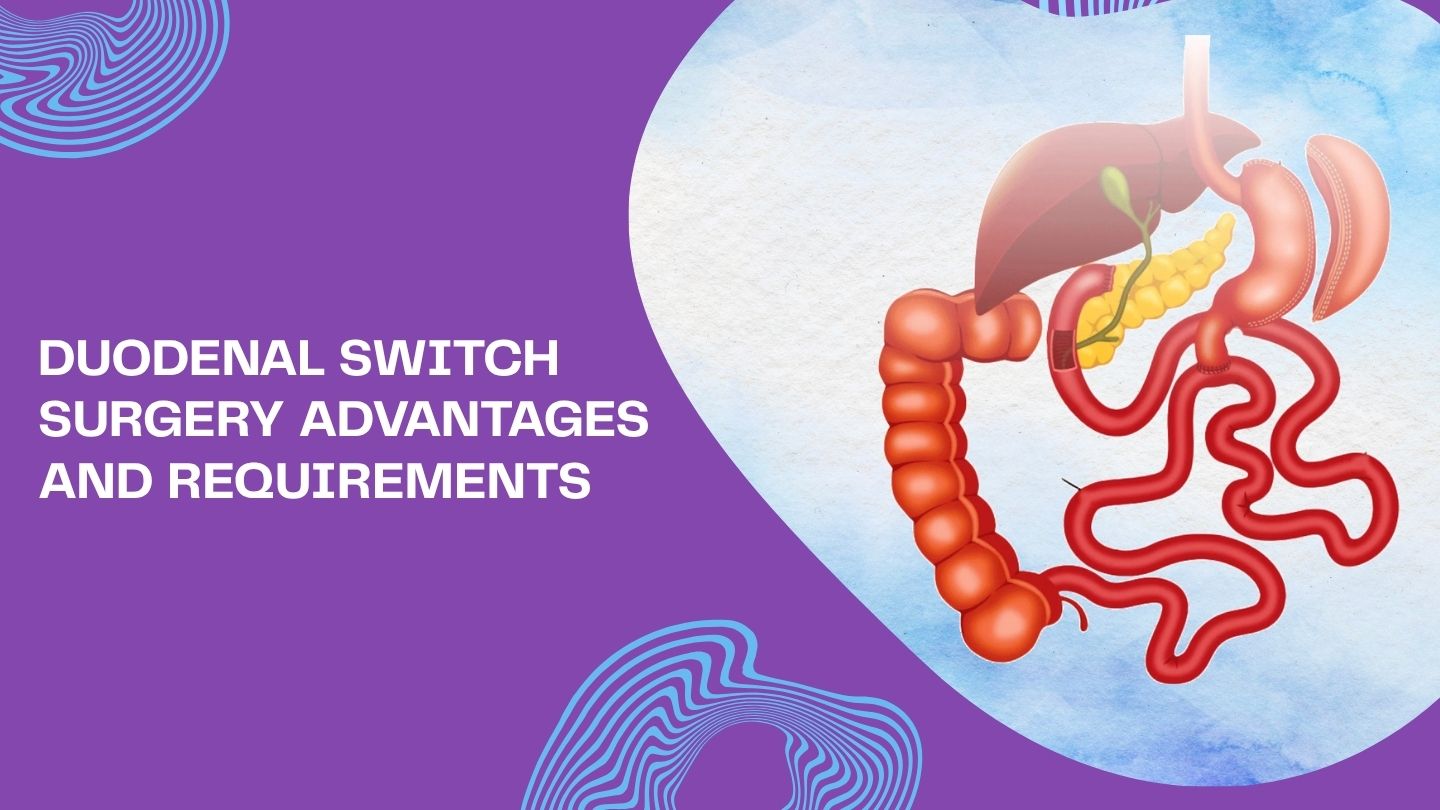
Duodenal Switch Surgery Advantages and Requirements
Duodenal switch surgery is a highly effective bariatric procedure designed to promote significant and sustained weight loss while improving obesity-related health conditions. It combines restrictive and malabsorptive techniques, allowing patients to achieve long-term results through both portion control and reduced nutrient absorption. This surgery often benefits individuals struggling with severe obesity or metabolic disorders. In this blog, we’ll discuss its major advantages and the key requirements patients must meet before undergoing the procedure.
Key Takeaways
- Duodenal switch surgery combines sleeve gastrectomy with intestinal bypass, leading to significant weight loss and health improvements for severely obese patients.
- Candidates must typically have a BMI of 40 or higher, or a BMI of 35 with obesity-related health conditions, and must undergo thorough preoperative evaluations.
- Postoperative care is essential, involving hydration, lifelong vitamin supplementation, dietary adjustments, and regular follow-ups to monitor recovery and nutritional health.
Duodenal Switch Surgery: An Overview
Duodenal switch surgery, a cornerstone in bariatric surgery, combines a sleeve gastrectomy with an intestinal bypass to treat severe obesity. This weight loss surgery is designed not only to reduce the stomach size but also to alter the food movement through the intestine, significantly impacting how the body absorbs nutrients and calories. The result is profound weight loss and improved health outcomes for individuals who undergo this gastric bypass, gastric sleeve, biliopancreatic diversion, with duodenal procedure.
Duodenal switch surgery aims for long-term weight loss and alleviates obesity-related health issues. Unlike other bariatric surgeries, the diversion with duodenal switch reduces the stomach by approximately 80%, creating a smaller, tube-like structure. This modification, along with the intestinal bypass, limits food intake and nutrient absorption, leading to substantial weight reduction. Additionally, the loop duodenal switch enhances the effectiveness of the procedure. The traditional duodenal switch is also an option for those seeking this type of surgery.
Performed laparoscopically, this surgical procedure minimizes invasiveness and recovery time, making it a preferred option for many. Patients benefit from reduced pain, smaller scars, and quicker rehabilitation compared to more invasive traditional surgeries. This innovative approach underscores the efficacy and appeal of the duodenal switch in the realm of metabolic and bariatric surgery.
Eligibility for Duodenal Switch Surgery
Eligibility for duodenal switch surgery hinges on several critical factors:
- A primary criterion is the body mass index (BMI).
- Candidates must have a minimum BMI of 40 or higher.
- Alternatively, candidates with a BMI of 35, accompanied by obesity-related conditions
- For individuals with a BMI over 55, the duodenal switch is often seen as an ideal option
However, BMI alone is not the sole determinant. Candidates must meet the following criteria:
- Have tried various weight loss methods without success.
- Those with serious health conditions associated with obesity related diseases
- A good candidate must have good overall health
A thorough healthcare evaluation determines candidacy for this weight loss procedure. This evaluation ensures the patient is well-prepared for the surgery and its aftermath, making it a critical component of the common weight loss procedures journey.
Advantages of Duodenal Switch Surgery

The advantages of duodenal switch surgery are manifold and compelling:
- Significant weight loss, with patients able to lose up to 80% of their excess body weight.
- Most patients see significant weight reduction within six to twelve months post-surgery.
- Dramatic improvements in health and well-being.
- Enhanced quality of life following the surgery.
For individuals with Type 2 diabetes, duodenal switch surgery offers superior outcomes compared to other bariatric procedures. The surgery provides several health benefits:
- Improves blood sugar control
- Lowers diabetes-related risks
- Improves high blood pressure
- Reduces cholesterol levels
Beyond the physical health improvements, patients frequently report enhanced overall quality of life, supported by understanding why duodenal switch has the highest success rate for long-term weight loss, which reinforces the effectiveness of this procedure for sustainable results. These combined benefits make the duodenal switch a highly effective solution for those struggling with severe obesity and its related complications.
Preoperative Preparation
Before undergoing duodenal switch surgery, thorough preoperative preparation is essential. Patients must undergo several medical evaluations, including:
- Blood tests
- Imaging of the stomach
- Heart screening
- Psychological assessment
These evaluations ensure that the patient is in optimal health for the procedure and can handle the postoperative lifestyle changes.
A critical aspect of preparation involves dietary adjustments:
- The typical preoperative diet is low in fat and carbohydrates while high in protein.
- This diet helps to reduce liver size and improve surgical outcomes.
- Patients are advised to quit smoking prior to surgery, as nicotine can hinder healing and increase surgical risks.
- The preparatory phase usually spans three to six months, providing ample time for patients to adjust to these changes.
This period of preparation is not just about physical readiness but also mental and emotional preparation. Following healthcare provider guidance ensures a smoother transition into surgery, setting the stage for successful weight loss and recovery.
How Duodenal Switch Surgery is Performed
The duodenal switch surgery is a meticulously planned and executed procedure. It begins with the removal of a substantial portion of the stomach, about 80%, resulting in a smaller, tube-like structure. This new stomach, roughly the size of a banana, significantly limits the amount of food a patient can consume, aiding in weight loss. During this process, the surgeon removes a significant part of the stomach, which is crucial for the success of the duodenal switch.
The surgery involves restructuring the small intestine to limit calorie absorption. The lower part of the small intestine is connected directly to the newly formed stomach, bypassing a significant portion of the digestive tract and reducing the absorption of nutrients and calories. This dual approach—reducing stomach size and altering the digestive pathway—sets the duodenal switch apart from other bariatric surgeries, including biliopancreatic diversion.
Performed under general anesthesia, the entire procedure typically lasts between two to four hours. Utilizing a laparoscopic approach, the surgery requires only small incisions, which minimizes recovery time and reduces the risk of complications. This method underscores the advanced surgical techniques used in modern bariatric operations, offering patients a safer and more efficient path to weight loss. Additionally, there are various bariatric surgery options available for those seeking to improve their health.
Postoperative Care and Recovery
Postoperative care is a crucial phase in the journey of duodenal switch surgery. Patients may experience a range of normal symptoms such as fatigue, nausea, and pain initially. Early mobilization, such as walking short distances and changing positions, is encouraged to enhance circulation and aid in healing.
Postoperative care recommendations include:
- Consuming 1.5 to 2 liters of water daily to maintain hydration.
- Lifelong daily vitamin supplementation to prevent nutrient deficiencies and ensure more vitamins.
- Regular follow-up appointments, especially in the first two years, to monitor recovery and nutritional health.
- Blood tests during visits to ensure the body is adapting well to surgical changes.
Patients should avoid strenuous activities and lifting heavy objects for several weeks post-surgery to prevent complications. Additionally, driving should be avoided until pain medication is no longer needed, typically around about two weeks after the procedure. The support of healthcare providers specializing in bariatric surgery is invaluable during this recovery period, offering guidance and reassurance as patients navigate their new lifestyle with less pain.
Lifestyle Changes After Duodenal Switch Surgery

Adapting to a new lifestyle is crucial after surgery. Consultations with a registered dietitian guide the necessary dietary changes before and after surgery, ensuring adherence to the best duodenal switch post-op diet guidelines for optimal recovery that promote healing and long-term success.
Key points include:
- Dietary focus shifts towards high-protein foods, with recommendations of 60-100 grams of protein intake per day to avoid muscle loss.
- Regular exercise, aiming for about 30 minutes of moderate activity daily, is encouraged to help maintain weight loss and improve overall fitness.
- Loose and frequent bowel movements are common due to the shortened small intestine, requiring adaptation.
These significant lifestyle adjustments pave the way for sustained weight loss and improved health, leading to permanent changes. With proper guidance and support, patients can successfully adapt and enjoy the transformative journey’s benefits to lose weight. Consuming at least 64 ounces of fluids daily is crucial to prevent complications, while following the best practices for diet after duodenal switch surgery helps patients maintain proper nutrition and long-term health after the procedure.
Transforming Health Through Surgical Precision
Duodenal switch surgery offers an advanced and highly effective approach to long-term weight loss and improved metabolic health. Combining stomach size reduction with intestinal bypass enables patients to achieve significant, sustained results while managing conditions such as diabetes, hypertension, and high cholesterol. With proper medical guidance, nutritional monitoring, and lifestyle changes, patients can experience lasting improvements in both health and quality of life.
At Wellstar Comprehensive Bariatric Services, our team specializes in gastric bypass surgery, duo switch surgery in Cobb County, and Marietta provides personalized care from consultation to post-surgery support. We focus on safety, education, and long-term success, helping each patient reach their weight loss goals with confidence. Trust us to guide your journey toward a healthier, more balanced future.
Frequently Asked Questions
How much weight can I expect to lose after duodenal switch surgery?
Most patients lose between 70% to 80% of their excess body weight within the first 12 to 18 months following surgery. Individual results vary depending on adherence to dietary guidelines, exercise, and follow-up care.
What is the recovery time for duodenal switch surgery?
Recovery typically takes four to six weeks, with most patients returning to normal daily activities within two weeks. Strenuous activities should be avoided for at least a month to ensure proper healing.
Are there any long-term dietary requirements after the procedure?
Yes. Lifelong vitamin and mineral supplementation is required to prevent deficiencies. Patients must also follow a high-protein, low-fat diet and stay hydrated to maintain long-term health.
Can duodenal switch surgery improve other health conditions?
Absolutely. This procedure often leads to significant improvement or remission of obesity-related conditions such as Type 2 diabetes, hypertension, and sleep apnea, enhancing overall quality of life.
Is duodenal switch surgery safe?
When performed by an experienced bariatric team, duodenal switch surgery is safe and effective. Like all surgeries, there are potential risks, but proper preoperative preparation and ongoing follow-up minimize complications.
